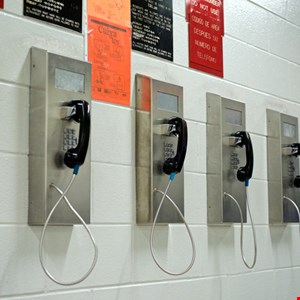- The best portable power stations for camping in 2025: Expert tested and reviewed
- "제조 업계, 스마트 기술 전환 중··· 95%가 AI 투자 예정" 로크웰 오토메이션
- What to Do If You Book a Hotel or Airbnb and It Turns Out to Be a Scam | McAfee Blog
- Cómo evitar la fuga de cerebros en TI
- Is ChatGPT Plus still worth $20 when the free version packs so many premium features?
DOJ to Consider Expanding Use of AI Prisoner Monitoring Tech

A House of Representatives panel has asked for a study to be done on the use of artificial intelligence (AI) to analyze prisoners’ phone calls.
Reuters reports that the United States Department of Justice (DOJ) has been asked to report on the use of AI monitoring as a tool to prevent suicide and violent crime.
The monitoring systems would be used to analyze and automatically transcribe inmates’ conversations, flagging particular words or phrases. Such technology is already in use in prison facilities in Alabama, New York, and Georgia.
A House Democratic aide said that the DOJ was being actively encouraged “to engage with stakeholders in the course of examining the feasibility of utilizing such a system.”
Commenting on the prospect of AI’s being used to monitor inmates’ phone calls, Texas resident Heather Bollin, whose fiancé is in prison, told Reuters: “It’s very unsettling. What if I say something wrong on a call? It could be misconstrued by this technology, and then he could be punished.”
Privacy groups have questioned the use of AI call monitoring in prisons.
“This Congress should be outlawing racist policing tech – it shouldn’t be funding it,” said Albert Fox Cahn, executive director of New York-based advocacy group the Surveillance Technology Oversight Project (STOP).
“People who have been caught up in the criminal justice system are always turned into the subjects of experimentation for new technology systems.”
A Stanford University and Georgetown University study into technology that transcribes voice conversations concluded that such tech has a high error rate when used to analyze words spoken by black people.
The study’s lead author Allison Koenecke, said: “Speech-to-text technology is not in a place where it can be used to make these kinds of criminal justice decisions.”
Police in Oxford, Alabama, already use Verus voice monitoring technology to listen in on prisoners’ phone conversations. Oxford chief of police Bill Partridge said that the tech had helped to prevent suicides and that inmates had been captured discussing “actually committing the murder.”
He said: “I think if the federal government starts using it, they’re going to prevent a lot of inmate deaths.”

